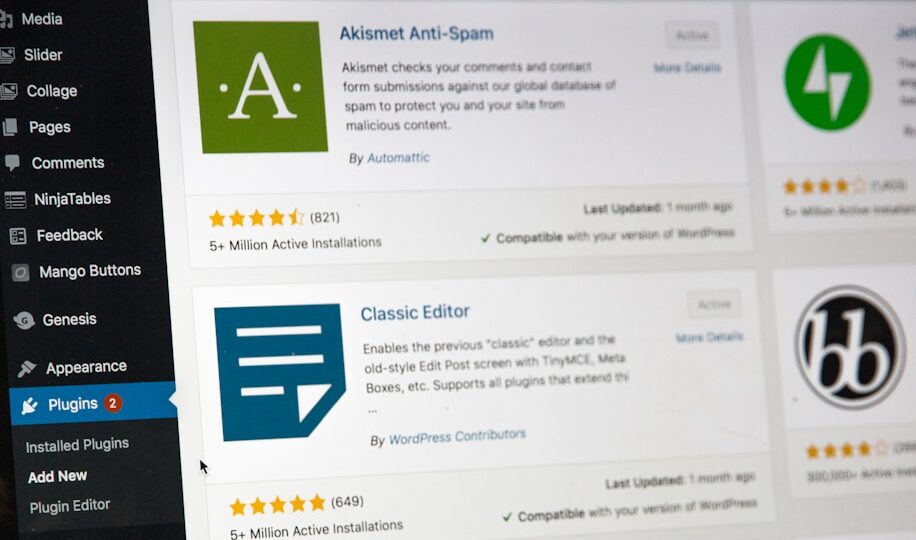WordPress is great because you can turn it into literally anything—blog, store, portfolio, shrine to your pet hamster—with just a few plugins. But like seasoning your food, more isn’t always better. One wrong plugin and your site slows to a crawl, your SEO dies, and your sanity evaporates.
So here’s a curated list of seven must-have plugins every WordPress site should have. No fluff. No garbage. Just good, functional stuff that won’t sabotage you.
1. Yoast SEO
For: Search engine survival
If you want your website to show up on Google somewhere other than page 42, you need SEO. Yoast helps with on-page optimization, meta descriptions, keyword targeting, XML sitemaps, and giving you low-key guilt when your readability score is trash.
Why it’s good:
- Clean UI
- Suggests improvements in real-time
- Plays well with most themes
- Gently judges your blog posts like an English teacher
2. WPForms (or Contact Form 7 if you’re a masochist)
For: Making sure visitors can actually reach you
Need a contact form? Don’t reinvent the wheel—or worse, write one in PHP.
Why it’s good:
- Drag-and-drop builder
- Pre-built templates
- Spam protection
- Doesn’t make your visitors hate you
Bonus: Contact Form 7 is fine if you like typing shortcodes and debugging weird CSS forever. But WPForms is actually designed for humans.
3. Akismet Anti-Spam
For: Blocking bots and trolls before they invade
Do you like getting 400 spam comments from bots selling knockoff sunglasses? No? Then install Akismet.
Why it’s good:
- Pre-installed on most WordPress setups
- Automatically filters spammy nonsense
- Saves you time, sanity, and blood pressure
Heads up: You’ll need to sign up for an API key, but that’s easier than cleaning spam manually. Trust me.
4. UpdraftPlus
For: Backing up your site like a responsible adult
Your website will break someday. You will mess up. Or your host will. Or a plugin will spontaneously combust.
Why it’s good:
- Schedule automatic backups
- Restore in one click
- Store backups on Google Drive, Dropbox, etc.
- Saves you from crying into your keyboard
5. Wordfence Security
For: Keeping the bad guys out
A hacked WordPress site is the digital equivalent of finding graffiti on your front door. Wordfence helps you sleep at night (or nap at your desk).
Why it’s good:
- Firewall
- Malware scanner
- Live traffic monitoring (yes, you can watch the bots try to break in)
- Two-factor authentication
6. Smush (Image Optimization)
For: Not tanking your page speed with 6MB stock photos
If you’re uploading uncompressed images, you’re not a content creator. You’re a bandwidth abuser. Smush optimizes your images automatically, without making them look like abstract art.
Why it’s good:
- Compresses images on upload
- Bulk smushes existing media
- Supports lazy loading
- Improves performance and SEO
7. LiteSpeed Cache or WP Rocket
For: Making your site not feel like dial-up
Caching = speed = happy users = better SEO = personal fulfillment (okay maybe not that last one).
Why it’s good:
- Speeds up your site with minimal configuration
- Reduces server load
- Supports image optimization, CDN, and more
- Makes your site feel like it took effort (even if it didn’t)
🚫 Honorable Mentions (to Install with Caution):
- Elementor: Great if you like drag-and-drop, but can get bloated fast.
- Jetpack: Offers everything and the kitchen sink. May also eat your RAM.
- WooCommerce: Essential for stores. Do not install if you’re not running a shop, unless you enjoy clutter.
🎯 Final Thoughts
You don’t need 37 plugins to build a great WordPress site. You need the right ones. These 7 will give you the essentials: SEO, security, speed, backups, contact, and anti-spam. Everything else is optional—or regrettable.
Install wisely. Update regularly. And if your site breaks, it’s probably your fault.
